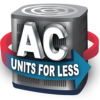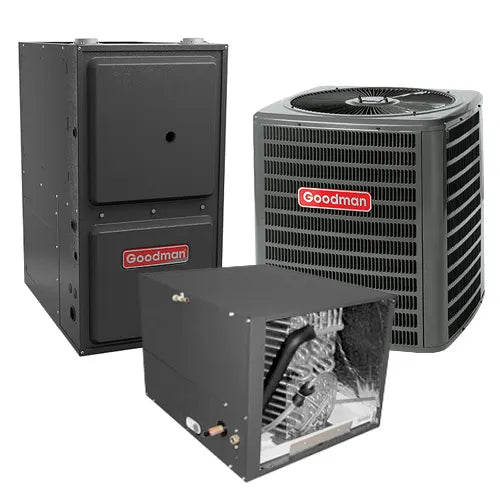As the seasons shift and temperatures level out, it's easy to take a break from thinking about your HVAC system. But did you know that the off-season — typically in spring and fall — is one of the best times to upgrade your system? Here at AC Units for Less, we see many homeowners benefit from choosing these less busy months to make significant upgrades. Let’s dive into the reasons why planning an HVAC upgrade during the off-season can be a smart choice for your comfort, savings, and peace of mind.
1. Greater Availability and Faster Installation Times
HVAC contractors experience peak demand during summer and winter when systems are working their hardest. When temperatures drop in winter or soar in summer, technicians are busy with emergency calls, repairs, and replacements. In contrast, the off-season is a quieter period for HVAC companies, meaning you can likely schedule installations and upgrades at your convenience without having to wait weeks for an appointment.
Why It Matters
- Less Stress: The quieter period means your upgrade will likely be installed quickly, reducing the time your home is without heating or cooling.
- Priority Service: In peak seasons, technicians might be rushed. The off-season allows for a more thorough, dedicated approach to installing and testing your new system.
2. Potential Cost Savings on Units and Labor
Many HVAC companies offer discounts during the off-season to keep business steady. Manufacturers might also roll out rebates or special promotions on new models, and some contractors may offer lower labor costs due to reduced demand.
Why It Matters
- Lower Prices on Units: Prices for HVAC units can vary depending on demand, and it’s common for manufacturers to reduce prices in the off-season to encourage sales.
- Discounted Installation Costs: When demand decreases, many contractors reduce their prices, allowing you to save more on installation labor.
3. Beat the Heat (or Cold) Before It Hits
Waiting until summer or winter to replace an aging HVAC system can mean risking a breakdown when you need heating or cooling the most. By upgrading during mild-weather months, you’ll avoid the inconvenience of sudden failures and keep your home comfortable when it matters most.
Why It Matters
- Proactive Comfort: Upgrading in advance means you’ll be ready for peak temperatures without worry.
- Avoid Emergency Repairs: Emergencies can be costly and disruptive, especially if your old system fails on a scorching or freezing day.
4. Access to the Latest Technology and Models
The HVAC industry, like any other tech-focused sector, sees frequent innovations. Off-season upgrades allow you to install the latest models with advanced features like smart thermostats, energy efficiency improvements, and enhanced air filtration.
Why It Matters
- Improved Energy Efficiency: Newer systems are often more energy-efficient, meaning you’ll save on monthly energy bills year-round.
- Enhanced Indoor Air Quality: Many modern systems offer improved filters and airflow control, which can benefit health, especially for households with allergies or asthma.
5. Better Energy Efficiency and Immediate Savings
Energy-efficient HVAC systems are designed to work smarter, not harder. Upgrading to a high-efficiency unit during the off-season not only reduces your carbon footprint but also begins delivering savings on energy bills right away.
Why It Matters
- Immediate Savings: You’ll start saving on utility bills before peak seasons hit, meaning you’ll feel the financial benefits faster.
- Tax Credits and Incentives: Some energy-efficient systems qualify for tax credits or local incentives, which are available on a first-come, first-served basis. Installing in the off-season improves your chances of securing these savings.
6. Flexibility to Make the Right Choice
Choosing the right HVAC system is a major decision, and rushing into it during peak seasons can lead to less than ideal outcomes. With fewer scheduling pressures in the off-season, you have more time to work with an HVAC professional to assess your home’s needs and select the best system.
Why It Matters
- Informed Decisions: You can explore various options, such as energy ratings, model features, and costs, to ensure you’re choosing the ideal system.
- Customized Solutions: HVAC professionals have more time to evaluate your unique needs and tailor recommendations, including proper sizing, which is crucial for optimal performance and efficiency.
7. Seasonal Preparation for Long-Term Peace of Mind
An HVAC upgrade during the off-season isn’t just a quick fix — it’s a proactive investment that ensures your home remains comfortable and efficient for years to come. Modern HVAC systems are designed with durability in mind, making this the ideal time to enhance your system’s reliability.
Why It Matters
- Fewer Future Repairs: New HVAC units are less likely to need repairs, reducing maintenance costs and inconveniences.
- Extended Warranty Coverage: Many manufacturers offer better warranty terms on new systems, giving you peace of mind that your investment is protected for years.
Wrapping It Up
Upgrading your HVAC in the off-season is a savvy move that offers a host of benefits — from increased flexibility and faster installations to cost savings and cutting-edge technology. By planning an upgrade in the quieter months, you’re giving yourself the time, options, and peace of mind that are harder to come by when the rush hits.
At AC Units for Less, we specialize in helping homeowners like you find the perfect HVAC solutions for year-round comfort. Contact us today to learn about our off-season promotions, explore our range of energy-efficient systems, and schedule a consultation with our knowledgeable team


